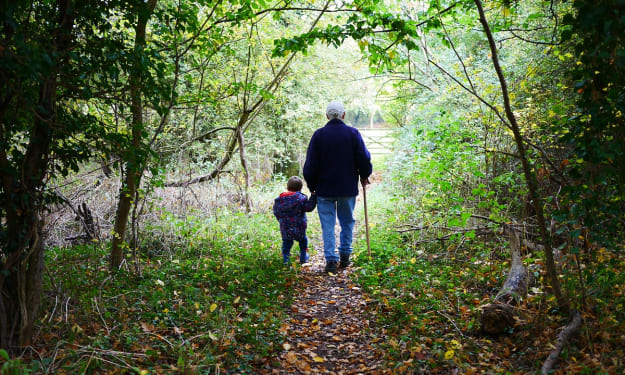The Price of Empathy
Questioning the ills of being a 'good' parent.

I recently read an article ominously titled “Being a good parent will physiologically destroy you, new research confirms”. The one subtitle casually read: Empathizing with your kid is great but it comes at a price.
As I read, what basically came across was a piece about empathetic parenting and a research study claiming to confirm how such parents impact their own immune systems negatively because of their approach to their child. It states how, when said parents see their children suffer psychologically, “their immune system takes a hit”. Let me get this straight. A parent has a physiological reaction when they witness their own offspring in distress? No?!! You don’t say?! Radical. NOT. This article hit various nerves for me. And surprisingly, it’s not because it is in fundamental disagreement with how I attempt to live my life as a parent and person. Nope, what got to me were the severe fallacies and shortcomings in the study that underlie almost all of what forms the premise for this piece (I say almost because it does acknowledge the positive impacts and outcomes that empathetic parenting has on the child, so at least kudos there).
So, in order of how they first ‘hit’ me, here are my qualms with what appears to be a desperate onslaught against empathetic parenting and empathy in general.
Firstly I’m willing to bet, that if the same team from Northwestern University put their minds and grant money towards and researched empathy in general, they’d probably find that empathetic people’s bodies react the same way even if it’s someone else in their family/ friend circle/ society they deeply care about, other than a child. Ergo, their ennui would then extend beyond just the realms of parenting and into how empathetic people in general (some of whom also happen to be parents) are intent on killing themselves with the kindness they bestow on their fellow human beings. What a weak day when we can conclude that empathy isn’t worth its price.
But hang on a minute, what about other emotions, feelings and mindsets that present as individual parenting styles? I’d wager another bet, a safe one already proven by countless scientific studies (more on these studies below), that most big emotions and mindsets that are rooted in stress towards a situation (in this case something to do with your child), would cause a negative physiological reaction in one’s body. This includes parents who show no empathy and instead choose anger expressed explosively by lashing out at the child or denial of the situation passive-aggressively expressed as a corrosive indifference to the child’s distress. Just because one might be inclined to outwardly ignore a stressor, does not mean that their body isn’t internally reacting to the situation. Following this thread of reasoning, it’s not empathy that leads to poor outcomes for parents but just the basic biological fact that our bodies react to stress and perceived stress at a cellular level whether or not we have an empathetic approach towards the little humans in our life. I wonder if they used a comparison group of exceedingly non-empathetic parents and a control group of parents with varying degrees of empathy. I doubt it but if so, what did they find? We’ll never know because they choose to concentrate only on the ills of empathy.
My next annoyance with this study is that it doesn’t appear to disentangle other factors such as, is a child’s depression surfacing due to other negative family factors like parental marriage stress or financial family constraints? This is pretty important because other ‘stuff’ that’s happening simultaneously, would definitely be linked to the child’s emotional and psychological health (both of which would directly impact the said parent too).
And then there’s my qualm with the sample size being statistically significant and therefore relevant. I’m not certain a sample size of 247 parent – teen dyads is actually representative of all empathetic parents because choosing a sample size is based on things like the prevalence of a trait in the general population, confidence level, margin of error and standard deviation etc. How does one accurately determine the total number of empathetic parents present in a given population when unlike something absolute and fixed like eye colour, empathy is a fluid and nuanced trait that can increase or decrease in a person throughout a period of time depending on other factors affecting them?
No one would deny raising a child empathetically will have some impact on a parent because empathy isn’t always easy. But guess what, perhaps that might be because parenting isn’t always easy. I don’t know of any parents who will disagree with that sentiment.
There’s no doubt that being childless is probably ‘easier’ on the health and psyche (and in a women’s case, easier on the body/figure/waistline etc.). However, I’d say if the choice is between being a disengaged and distant parent to protect one’s own health, it’s a better one to be a childless and healthy adult. Which brings me to another simplistic and broad generalisation the article makes – that “good” parents aren’t able to meet their own basic needs. This is bull IF the parent (no matter what their attitude to parenting) has a strong support system of trusted and willing friends or relatives ones to help with making the proverbial “village” to help raise the child a.k.a the literal future of society.
And finally, I’m left wondering – what was the larger point of this study? Most studies are designed to add something to the fabric of society, whereas this one seems to give weight to encouraging a diminished sense of empathy amongst those who likely already struggle with developing it. It basically promotes apathy. If the point was to promote self-care amongst caring parents, I’d say that the mark has been missed greatly because I don’t think empathy and nourishing oneself are mutually exclusive. In fact, I’d argue that true empathy begins inward and radiates outwards – after all, isn’t it through cultivating reflection and awareness of our own emotions and feelings that we build the ability to understand the feelings and emotions of another?
Having had my curiosity piqued, I did a quick and nerdy literature review-style search about empathy and found a wealth of research done by the Center for Building a Culture of Empathy that reiterates over and over, the mental, physical and psychological benefits of having an empathetic approach – both for the empath and recipient. These look at empathy in various and diverse populations and environments and can be found here.
What appears to be a common theme is that empathy fosters deeper connection to each other and actually has significant health benefits. On a social level, it is the glue that holds all relationships together and promotes collaboration over conflict. It also seems to determine overall satisfaction with intimate and other relationships. If I, as one mum can teach my son how to access all of that good stuff simply by being an empathetic parent, I’d say the value of empathy by far out does its so-called ‘price’ tag.






Comments
There are no comments for this story
Be the first to respond and start the conversation.